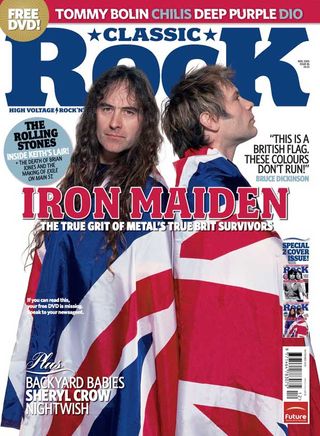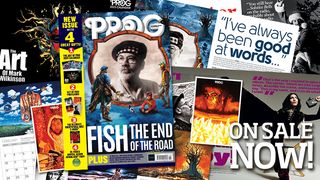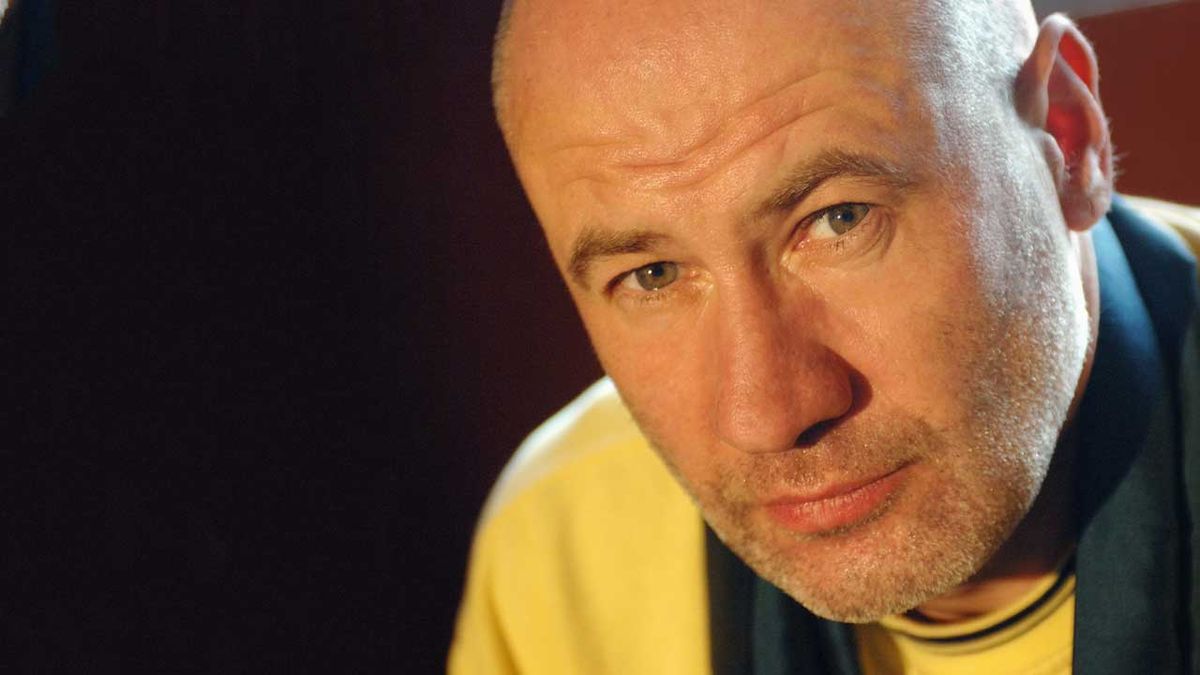In 2005, former Marillion frontman Fish released a career-defining two-CD best of, the cunningly titled Bouillabaisse, then headed off to play live shows that included a performance of his old band's classic Misplaced Childhood album alongside his own material. As the album was released, he spoke with Classic Rock about his plans.
A solo artist – and also now a respected actor and writer – with a career covering some 15 years, Fish admits he now feels comfortable tackling the album that helped project him to star status back in 1985.
His decision to do so has also been welcomed warmly by the fans. Equally, he hopes Bouillabaisse will introduce his fans to his more recent albums, including 2001’s Fellini Days and 2003’s Field Of Crows, which represent something of a return to form for him.
These days happy and relaxed, Fish talks amiably about the ups and downs of his solo career, and also his renewed faith in the youth of today and their attitudes to his music.

After Yin And Yang and Kettle Of Fish, Bouillabaisse will be your third compilation album.
Well, Yin And Yang came out in 95, when we had the Dick Brothers record company on the go. It was more a financial necessity, because the Suits album had come out in 94 and we had to keep on tour. There were a lot of financial problems, having just left Polydor Records, so Yin And Yang was kind of a different approach, because we re-recorded a lot of the old numbers.
The Kettle Of Fish one came out in 98 – part of the highly disappointing saga with Roadrunner Records. I look at it now and it’s a single album and it’s not really representative of my career. With Bouillabaisse, when I heard the two CDs to make certain it joined properly, I felt it really worked.
Why have you split the compilation in two, with one CD titled Balladeer and the other Rocketeer?
I think having the ballads on one album and the muscular stuff on the other really clicks well. Since Kettle Of Fish, in my opinion, there’s been some really good albums [of mine] that have just gone missing out there: Fellini Days, Field Of Crows and Raingods With Zippos. I mean, when I listen to the Plague Of Ghosts track, you just can’t ignore it. I think it sounds modern, it doesn’t sound dated.
Some of the stuff on the Kettle… album sounds dated now, but if you listen to the Bouillabaisse material, even though there are tracks that were on the Kettle… album, it’s got a lot more weight to it. And I’ve always wanted to put a ballad album together – an album for the ladies, ha ha.
How did you go about choosing what to include on Bouillabaisse?
I’ve got a 14-year-old daughter, and she’s changed my whole approach to music. I’m a news junkie – I’ll have news on in the office the whole time. Now she’s putting on the Foo Fighters or James Blunt in the morning. One of her favourite albums is the new Robert Plant album [Mighty Rearranger].

So now, when we go to Tesco we buy an album a week each and we sit and play them to each other and talk about them. I’d kind of lost track of what Robert Plant was up to until he released that double album [Sixty Six To Timbuktu]. That switched me back in, and I got his new one. And that was the kind of thinking behind the Bouillabaisse album: someone might think, “Oh, I remember this guy, I bought Vigil In A Wilderness Of Mirrors”, or whatever, but never bought anything else.
It’s been difficult to keep tabs on my career throughout the EMI and Polydor saga for people in mid-stream. It was pretty horrible affair to deal with from a creative point of view; trying to keep your head together through all that, and make albums passionate and keep your head away from all the bitterness. And I think a lot of people lost touch with me around that period.
Hopefully Bouillabaisse will reintroduce people to that period. I mean, with Field Of Crows, Bruce Watson [ex-Big Country guitarist] and myself felt that if that had been put out by a 30-year-old there’d have been a totally different approach from the media.
Your solo career might not have panned out in the way you would have liked, but it seems that musicians in your situation have more avenues open to them to further their own careers these days.
Absolutely. The internet is an incredibly powerful tool for myself and other bands. There is a case nowadays where you almost have this Victorian dinner party vibe: after dinner they’ll get round to playing music, and someone might pull out Misplaced Childhood or whatever, and the next thing they’re on the computer finding your website and they end up buying your new albums. We find that all the time. That two-way conduit you have with people through the website has really kept me and a lot of others going, including my former band.
In the media in general over the last few years, do you think there’s been a softening of attitudes towards the style of your music?
Yes. But the style I do isn’t Dream Theater territory, purist prog. Listen to the Rocketeer CD and there’s a lot of hard-edged stuff on there. I know from the fanbase it’s a bit like the skin effect where you’re forever shedding skin but growing it too. But on the last tour, we were going into the bar and there were kids 20 years old, and they couldn’t have even seen Marillion.
Take my daughter – she’s got a Led Zeppelin poster and the Pink Floyd prism and a Kurt Cobain poster. I remember the one thing I always kept from kicking about bedsits was a Yes poster from the Relayer tour – and all my tickets stubs – which I finally got framed. And she saw it hanging in the spare bedroom and asked me if she could have it, saying: “I wish I was born back then. You must have seen all these great bands and I’ll never see them”. And when you’ve got that kind of attitude out there it reinforces your faith in the youth of today.
There are three Marillion tracks on Bouillabaisse. Was it difficult to choose just three of these, and also any Marillion at all?
No, absolutely not. We picked the three that are the biggest singles. Everybody knows Kayleigh, and it’s part of the bait on the hook, you know. I was in two minds about whether to include the tracks, but I was pleasantly surprised at how well Kayleigh and Lavender fit into it.
Obviously the production’s a little bit different, but as songs they add to the argument that I’m the same artist playing with a different band. You can see the roots of what I’m doing now in those songs and [Marillion’s] Incommunicado.
Your very first solo single, State Of Mind, has been left off. That was surprising.
That was a real tough one. But if I’d have put it on we’d have been weighed down with too much Vigil… material. And lyrically State Of Mind is so valid today. I had to make some difficult decisions.
This interview was originally published in Classic Rock 86 (November 2005). Fish is the cover star of the new issue of Prog magazine.




